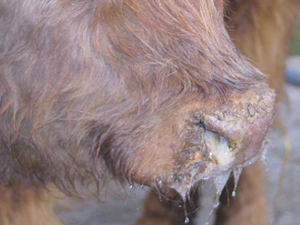While unrecorded in New Zealand, Bluetongue, an acute viral disease in ruminants, is endemic in tropical and sub-tropical climates.
Experts suggest that climate change could increase the distribution of the disease, which should cause some concern as our closest neighbour with the problem is Australia.
Currently in Northern Europe, an area that could hardly be described as sub-tropical, there have been over 4000 cases reported in the last two months in Belgium, the Netherlands and Germany. Since late August, the problem has moved over the English Channel to the UK, likely via midges that have been carried from the European continent.
Bluetongue is a notifiable disease in the UK, and the Department for Environment, Food and Rural Affairs (DEFRA) has declared restricted movement orders in infected areas that encompass much of eastern and southern England, in regions including East Riding of Yorkshire, Lincolnshire, Cambridgeshire, Bedfordshire, Hertfordshire, Greater London, Surrey, East Sussex and parts of Hampshire, with around 140 cases reported to date.
Typically spread by some species of biting midges, movement of infected animals, blood, ova and embryos, infected pregnant animals can also transmit to their young. In sheep, where there appears to be greater reports of infection, typical symptoms are ulcers or sores in the mouth or on the nose, discharges from the eyes or nose and drooling.
This progresses to swelling of the lips, tongue, head and neck, alongside red staining of the skin caused by blood collecting beneath the surface. As the virus progresses, animals develop a fever, lameness, breathing issues – further compounded by abortion, foetal deformities, stillbirths and ultimately, death. Lambs born alive, with typically be weak, deformed or blind and unlikely to survive for more than a few days.
In cattle, typical symptoms include lethargy, crusty lesions around the nostrils and muzzle, redness of the mouth, eyes and nose, alongside redness of the skin above the hoof, with redness and erosion of the teats. This is followed by fever, milk yield reduction, loss of appetite and like affected sheep, abortions, foetal deformities and stillbirths. Cattle may be infectious for several weeks, without showing any outward signs of the disease and interestingly are usually the preferred host of the biting midges.
Prevention should be centred around responsible sales and movement of livestock, taking care to identify any early signs of infection before selling animals. Experts suggest that if possible, it would be helpful to reduce exposure of animals to the risk of biting midges at dawn or dusk. In the same vein, hygiene and biosecurity needs to hold to high standards, ensuring farm or wild animals or carrion do not have any access to aborted or infected materials or afterbirths.



















